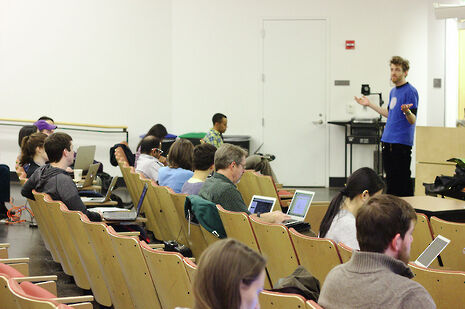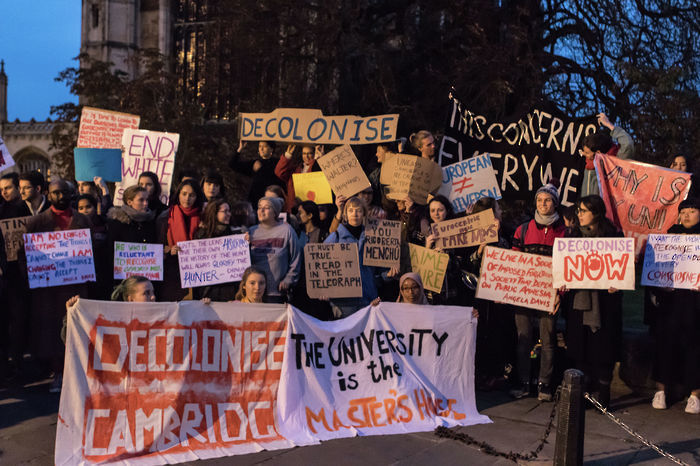How freshers’ workshops help us reconsider our prejudices and privileges
Sophie Zhang reflects on their experience working at LGBT+ and BME workshops during freshers’ week.

Earlier this term was the first time many colleges across Cambridge introduced new freshers’ week workshops that focussed on either one or both of LGBT+ and race issues. One of the motivations behind creating these workshops was to tackle the prevailing prejudices that, in rippling through British society, can often be felt within our University. Although British society has made some progress in recent decades, especially in terms of LGBT+ issues with the legalisation of same-sex marriage in 2014, discrimination and prejudice still persist.
The Big Cambridge Survey 2018 found that 52% of BME students at Cambridge students reported being affected by racial prejudice, and in the previous year the survey found that LGBT+ students “consistently reported higher rates of discrimination based on protected characteristics [such as sexuality and gender]”. These workshops were introduced to tackle prejudice by giving students foundational information about racial and LGBT+ issues and encouraging students to respect and stand up for individuals from marginalised groups.
Freshers’ week is an apt time for introducing students to new ideas for a variety of reasons. University marks a new milestone in each student’s life, so it is also a good place to start anew and attempt to rectify any gaps left by their schools. For example, I thought it would be beneficial to talk about LGBT+ issues during freshers week, as the lack of inclusion about LGBT+ issues in the school curriculum meant that knowledge surrounding LGBT+ issues was often uneven and sketchy. Furthermore, since students are arriving in a new environment, they should be particularly open to discussing new ideas.
Since students are arriving in a new environment, they should be particularly open to discussing new ideas
By putting on these workshops at the beginning of term, we are recognising that students arrive at university with different amounts of knowledge about certain social issues. This is also why it’s important to discuss these issues with them before term starts, in order to encourage them to think critically about issues such as race, gender, and sexuality, and therefore help them avoid perpetuating discrimination during their time at university. This is especially important because students will be encountering and interacting with people from a wide range of social groups, which they might not have encountered before coming to university.
These motivations to run LGBT+ workshops led me to approach the CUSU LGBT+ campaign with this idea earlier this year, and they gladly supported it, promising to make the workshops official next year. Similarly, the BME campaign and many BME officers were enthusiastic in creating materials for a workshop that discussed issues of race and racism, especially talking about issues such as microaggressions, problems regarding diversity within Cambridge, and implicit racism, which some students might be unaware of. It was particularly inspiring to see different members of the BME campaign and BME officers coming together to work on the new BME workshops together over the summer holidays, and encouraging as many colleges as they could to implement the new workshop.
The path from conception to implementation was not always smooth – having not attended one of these workshops myself as a fresher, I initially struggled to know what to include in the presentation. I was prone to making mistakes and mishaps as I gave the workshops to freshers and there was a real mix of responses from them: some positive, some negative. But this was to be expected, and is why we ran the workshops in the first place. What really made my day was when freshers talked about how the workshops opened their eyes to new perspectives or said that they felt validated by the workshops, which emphasised being respectful towards students from marginalised groups.
During the process of running these workshops, it was particularly uplifting to see so much support from my own JCR and college, along with my college’s BME officer. It was encouraging to see so many people volunteer to help run the workshops, and it was great to witness allyship in action – a topic we had spent much time discussing in the workshop.
I think the most important thing is that we have begun a very explicit dialogue about issues of race, gender, sexuality and prejudice, which has raised questions about privilege and prejudice that some students may not have paid much attention to previously. Although I understood from feedback that the LGBT+ workshops I had put together were not perfect, I knew that at the very least I had started a conversation and process which can be refined by future LGBT+ officers as more experience and knowledge are accumulated.
 News / Caius mourns its tree-mendous loss23 December 2025
News / Caius mourns its tree-mendous loss23 December 2025 News / Clare Hall spent over £500k opposing busway 24 December 2025
News / Clare Hall spent over £500k opposing busway 24 December 2025 Comment / The ‘class’ of Cambridge24 December 2025
Comment / The ‘class’ of Cambridge24 December 2025 Interviews / Politics, your own way: Tilly Middlehurst on speaking out21 December 2025
Interviews / Politics, your own way: Tilly Middlehurst on speaking out21 December 2025 Comment / Yes, I’m brown – but I have more important things to say22 December 2025
Comment / Yes, I’m brown – but I have more important things to say22 December 2025








